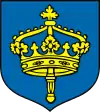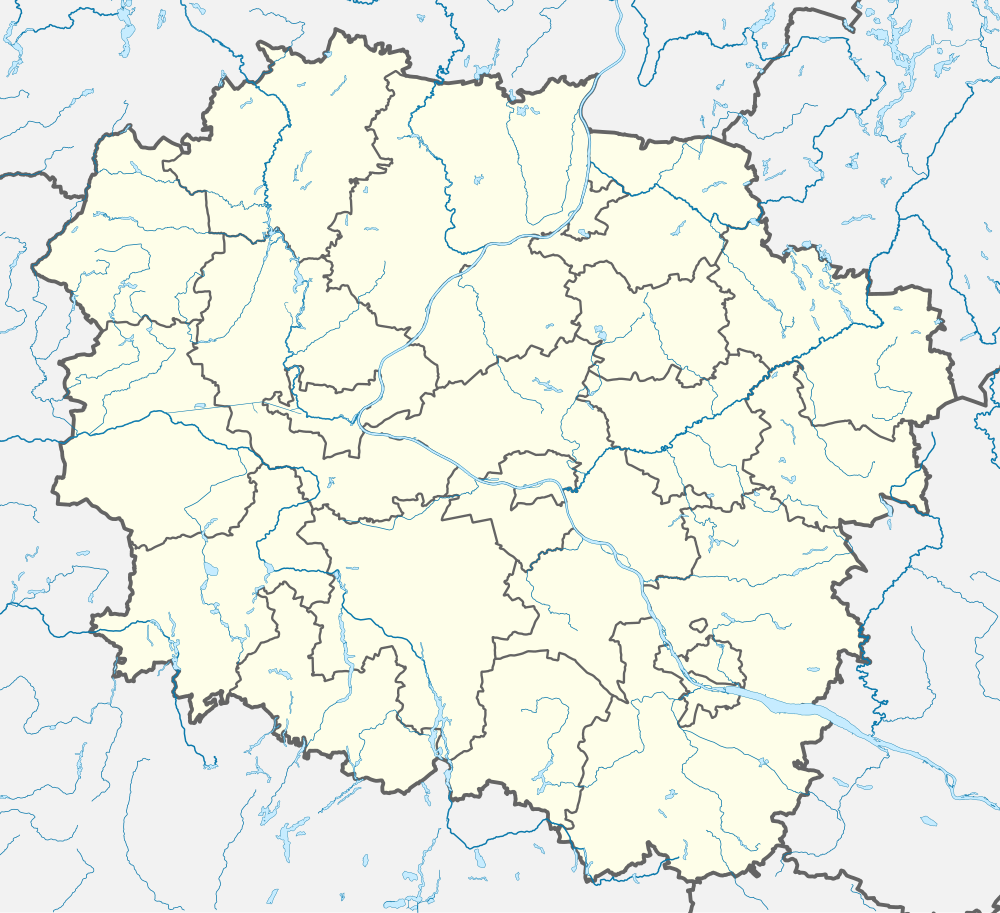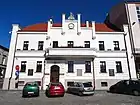Koronowo
Koronowo [kɔrɔˈnɔvɔ] (German: ![]() Krone / Crone an der Brahe , archaic Polnisch Krone) is a town on the Brda River in Poland, located in the Kuyavian-Pomeranian Voivodeship, 25 km from Bydgoszcz, with 11,029 inhabitants (2010). It is located in the historic region of Kuyavia.
Krone / Crone an der Brahe , archaic Polnisch Krone) is a town on the Brda River in Poland, located in the Kuyavian-Pomeranian Voivodeship, 25 km from Bydgoszcz, with 11,029 inhabitants (2010). It is located in the historic region of Kuyavia.
Koronowo | |
|---|---|
 Town square | |
 Flag  Coat of arms | |
 Koronowo  Koronowo | |
| Coordinates: 53°19′0″N 17°56′0″E | |
| Country | |
| Voivodeship | Kuyavian-Pomeranian |
| County | Bydgoszcz |
| Gmina | Koronowo |
| Established | 7th century |
| Town rights | 1370 |
| Government | |
| • Mayor | Patryk Stanisław Mikołajewski |
| Area | |
| • Total | 28.18 km2 (10.88 sq mi) |
| Population (2010) | |
| • Total | 11,029 |
| • Density | 390/km2 (1,000/sq mi) |
| Time zone | UTC+1 (CET) |
| • Summer (DST) | UTC+2 (CEST) |
| Postal code | 86-010 |
| Car plates | CBY |
| Website | http://www.koronowo.pl/ |
The town of Koronowo has an area of 2,818 ha and this makes it one of the largest towns in Bydgoszcz County. The Koronowo municipality has an area of 41,170 ha and 23,052 inhabitants.
History
.jpg.webp)
In the Early Middle Ages, a Slavic stronghold was built in present-day Koronowo.[1] It was included into the emerging Polish state in the 10th century and finally integrated with it in the 12th century.[1] In 1288 the Cistercians from nearby Byszewo founded an abbey in Koronowo.[1] The settlement prospered due to its location at the intersection of trade routes from Kuyavia and Greater Poland to Gdańsk, and from the Chełmno Land to Western Pomerania.[1] In 1359 King Casimir III the Great vested it with town privileges, which however were not implemented[1] until 1370. The name Koronowo comes from the word korona ("crown"). Administratively it was located within the Inowrocław Voivodeship in the Greater Poland Province of the Polish Crown.[2] A significant battle took place nearby in 1410 during the Polish–Lithuanian–Teutonic War, in which Poland defeated the Teutonic Knights.
King Casimir IV of Poland by virtue of privileges of 1476 and 1484, established two annual fairs and a weekly market.[2] Among the main activities of the population were crafts, pottery, brewing and agriculture.[2] In the 17th and early 18th century Koronowo suffered due to Swedish invasions, the Great Northern War and epidemics.[2] King Augustus III of Poland established two more annual fairs to help revive the town.[2] The town was annexed by Prussia in the late 18th century Partitions of Poland and was restored to Poland, after the country regained independence in 1918.

13 Polish soldiers were killed on September 2, 1939, during the German invasion of Poland, which started World War II.[3] During the subsequent German occupation, the Polish population was subject to mass arrests, expulsions and massacres. The Germans established a prison for Poles,[4] in which 606 people died.[3] Many Polish inhabitants of Koronowo and nearby villages were murdered by the Germans in nearby Buszkowo on 5-6 October 1939 and in the forest near Koronowo on 26 October 1939.[5] Koronowo was captured by the Soviets in January 1945 and restored to Poland.
Sport
- Victoria Koronowo - football club
Gallery
.jpg.webp)
 Town Hall (Ratusz)
Town Hall (Ratusz).jpg.webp) Battle of Koronowo monument
Battle of Koronowo monument Brda river in Koronowo
Brda river in Koronowo
References
- "Historia miasta. Od ustroju plemiennego do cystersów". Gmina Koronowo (in Polish). Retrieved 10 May 2020.
- "Historia miasta. Dzieje do okresu zaborów". Gmina Koronowo (in Polish). Retrieved 10 May 2020.
- "Historia miasta. Mroczny czas okupacji". Gmina Koronowo (in Polish). Retrieved 10 May 2020.
- Maria Wardzyńska, Był rok 1939. Operacja niemieckiej policji bezpieczeństwa w Polsce. Intelligenzaktion, IPN, Warszawa, 2009, p. 111 (in Polish)
- Wardzyńska, p. 161
External links
- Municipal website (in Polish)
- Koronowo portal (in Polish)
- Koronowo - camera on-line (in Polish)
- Satellite photo from Google Maps
- Okoń, Emanuel (2016). The Historical Atlas of Polish Towns - Kujavia - Koronowo (PDF) (in multiple languages). volume 2, book 2. Ministry for Science and Higher Education. ISBN 9788323134930.
- Koronowo Zamek (Prison 1941-1945))
| Wikimedia Commons has media related to Koronowo. |